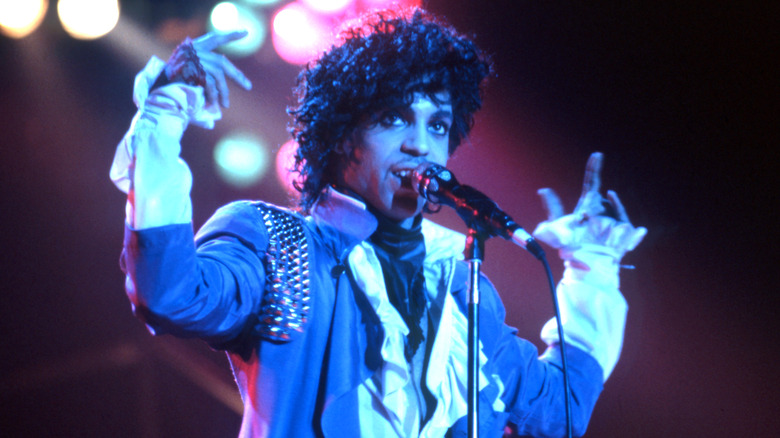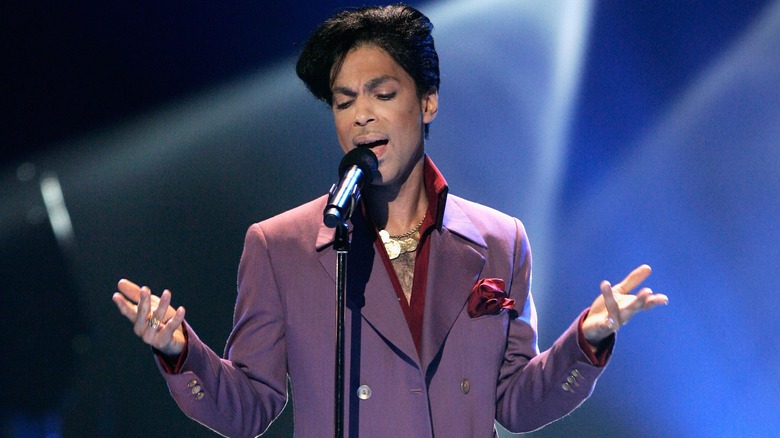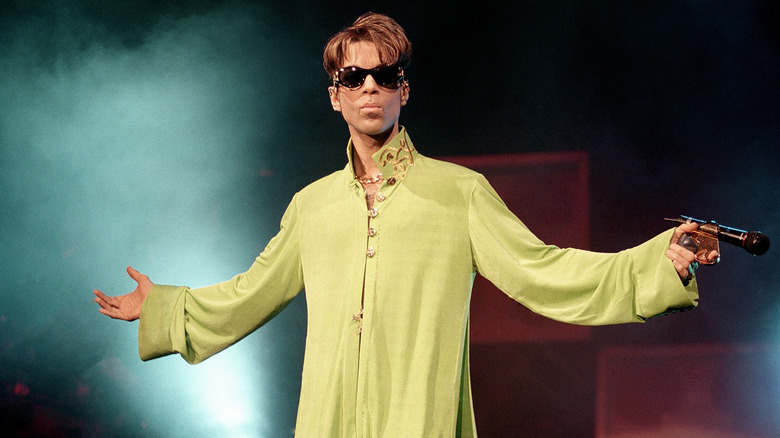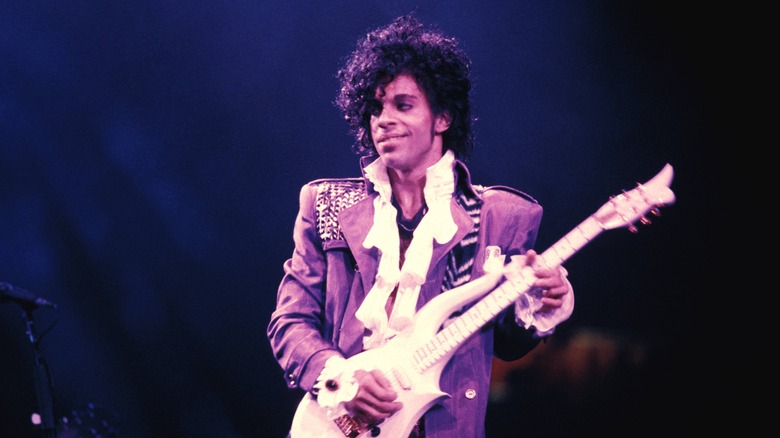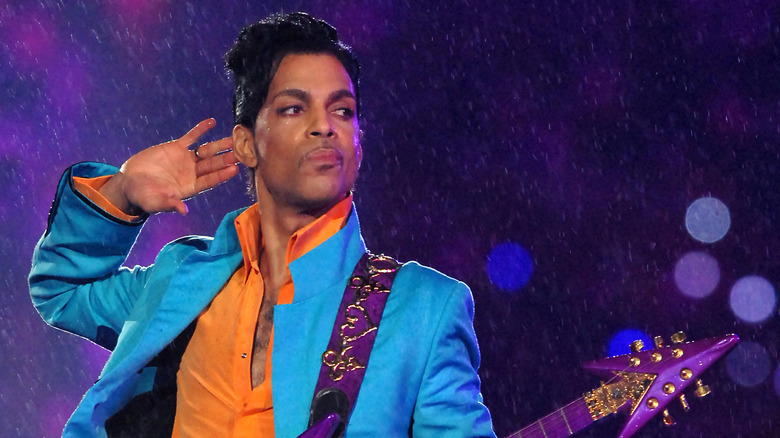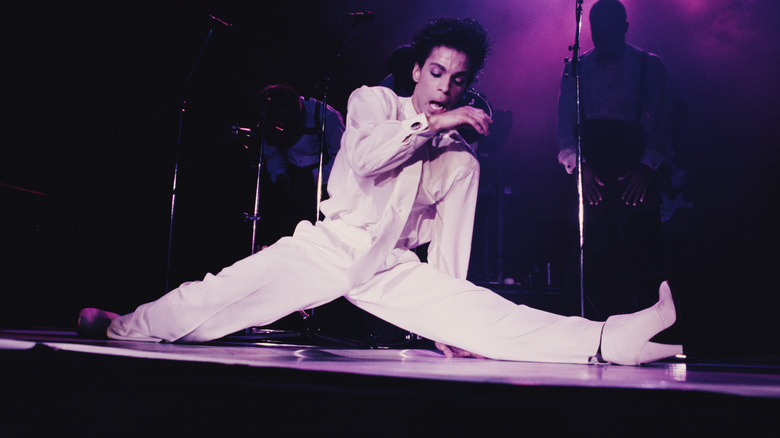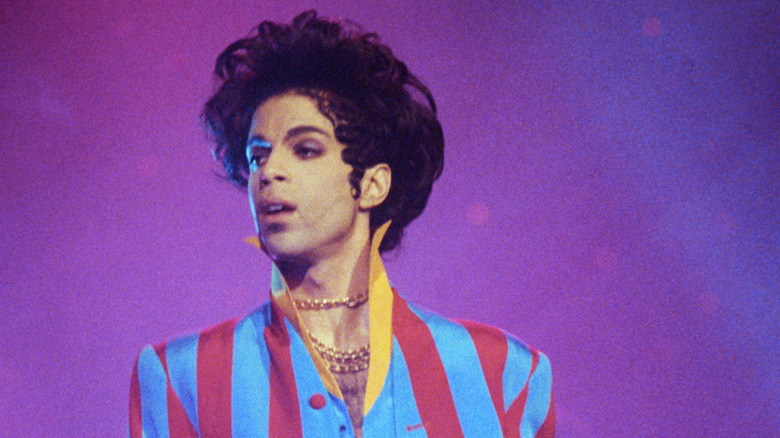Details About Prince's Death That Don't Make Sense
On April 21, 2016, Prince Rogers Nelson — better known as Prince — died. He was 57 years old. Fans, peers, and industry pundits couldn't believe the esteemed and flamboyant musician, who also used the names Symbol and the Artist Formerly Known as Prince once upon a time, was gone. The disturbing details discovered in Prince's autopsy report revealed that he had extremely high levels of fentanyl in his body, which proved fatal for him.
Yet, while the cause of Prince's death remained clear, a number of thought-provoking questions popped up surrounding the circumstances of that fateful day in April 2016. There's the topic of the precarious and highly publicized medical emergency he experienced six days before his death, and if it was somehow an ominous precursor for what was to come. There's also the fact that no arrests occurred in the aftermath, especially odd considering the evidence of illegal prescriptions and counterfeit pills. Then, there's the strange six-year dispute surrounding his will and estate ... in short, several things don't add up here.
As expected, many people put on their tinfoil hats and conjured up all sorts of conspiracy theories about it in the years since the "Purple Rain" singer's passing. However, let's cut through the speculation and take a closer look at the legitimate puzzling questions about Prince's death.
Prince experienced a medical emergency six days before his death
On April 15, 2016, a private plane carrying Prince was forced to make an emergency landing at Quad City International Airport in Moline, Illinois. After the plane landed, Prince was taken to hospital for further treatment. According to his representative, the musician experienced the effects of the flu for a few weeks and felt unwell.
On the plane with Prince that day was Kirk Johnson and musician Judith Hill. The latter recounted a different story to The New York Times, which appears to be ominous for what was to come six days later. Hill explained how she had been talking to Prince when he lost consciousness. Hill and Johnson attempted to wake him up as the plane landed. On the tarmac, Prince received Narcan, also known as naloxone, which is used to rapidly reverse an opioid overdose.
While Hill was reluctant to discuss Prince's treatment that day, she disclosed that between her and his friends, they called for the assistance of Dr. Howard Kornfeld from the Recovery Without Walls clinic. According to Hill, Prince agreed to it, too. "He did it because he was concerned, and he wanted to do the right thing for his own body," Hill said. "And that's the part that breaks my heart, because he was trying. He was trying." The question remains: Why didn't Prince enter the Recovery Without Walls clinic immediately after the plane incident?
The nature of Prince's relationship with pain pills
Prince presented himself as the poster child for clean living. While he might have rocked and rolled through an era that promoted excess, he reportedly didn't want artists who indulged in alcohol and drugs on tour with him. One of the things we learned about Prince after he died was that there was another side of him that not many people were aware of.
According to some reports, Prince's body experienced pain after decades of grueling performances, and some claimed that Prince had taken painkillers for years before he decided to have hip surgery in the 2000s. Thereafter, he received more prescription pills, and when he died, authorities found a number of pills around his house. His use of painkillers, though, wasn't a secret to his closest friends and confidantes, leaving behind questions of what measures — if any — were taken by these people to help the musician.
Prince's ex-girlfriend, Charlene Friend, claimed to People that he was good at hiding what was taking place in private. She said that Prince's half-brother Duane Nelson told her that Prince misused cocaine, which helped him to stay awake for extended periods of time. In addition, Friend alleged that others told her he would take painkillers after his shows for a specific reason. "Nothing could match the highs he got from his shows," she said. "Coming down afterwards made him feel empty. Perhaps drugs filled that void."
How did he obtain counterfeit pills?
Prince's official cause of death was determined accidental and due to fentanyl poisoning." What never made sense about this is why Prince would be taking fentanyl in the first place. It was established that he took painkillers, but he never had any prescriptions for fentanyl to his name, so how did he acquire this lethal substance? After Prince's death, investigators found around 49 black market pills that contained traces of — you guessed it — fentanyl.
Addiction psychiatrist Scott Bienenfeld proposed that Prince didn't even know he was taking something else to begin with, stating (via Rolling Stone): "The majority of my patients are pain patients, and someone gave them fentanyl as an add-on: 'You've taken OxyContin, now take this.' Most of these musicians, trust me, don't know it's laced with fentanyl." These types of counterfeit pills are produced in other countries, then brought back into the U.S., where they are sold for as little as $10.
According to an attorney for the state of Minnesota, Mark Metz, Prince believed the pills he was taking were Vicodin. However, it was undetermined how the musician attained them. "There is no reliable evidence showing how Prince obtained the counterfeit Vicodin containing fentanyl," Metz said. "The bottom line is that we simply do not have sufficient evidence to charge anyone with a crime related to Prince's death."
Prince despised elevators, but died in one
Upon arriving at Prince's Paisley Park on April 21, 2016, medical personnel found the unresponsive musician inside an elevator. They proceeded to give him CPR in an attempt to resuscitate him, but he was pronounced dead shortly after they arrived. While this might seem like a minor detail in the grander context of what happened, music executive L.A. Reid appeared on "CBS This Morning" to discuss how this event chilled him because of a conversation he had with Prince beforehand.
Reid mentioned Prince and the Revolution's song "Let's Go Crazy" – from the 1984 "Purple Rain" record — specifically the lyric: "Are we gonna let the elevator bring us down?" Reid added: "One time, when I was with him, privately, he said, 'You know what the elevator is, right?' I said, 'No, what's the elevator?' He said, 'Well, the elevator is the devil.' It scared me. I don't like to talk like that, but he said that. So, for me, it was like really haunting when I read that he was found in an elevator."
Reid's comments provide some food for thought, in terms of whether this was a metaphor or if Prince truly saw a physical elevator as an evil presence. Regardless, it proved to be the place in which he died.
No one was arrested
Authorities discovered Prince possessed counterfeit pills which contained the high levels of fentanyl that resulted in his death. However, no arrests were made in connection to this, with authorities saying they didn't have enough evidence to go after anyone. Considering Prince's high profile and the nature of his death, it was surprising that no one was charged or implicated in this matter.
In addition to this, authorities discovered that Dr. Michael T. Schulenberg allegedly prescribed a painkiller in someone else's name for Prince a week before he died. In doing so, Schulenberg went against the Controlled Substances Act, but he only faced a $30,000 civil charge. However, it was noted that Dr. Schulenberg paying the money "is neither an admission of facts nor liability," according to the court records (via ABC News).
Prince's sister, Tyka Nelson, told Rolling Stone that no prosecution would bring her brother back. "You can charge 20,000 people and toss them in jail," she said. "Will that bring my brother back? It's not. It didn't matter if it was a knife or a gun or fentanyl. If it doesn't bring back my brother, it didn't matter."
There was no will
Being a public figure or even someone with immense wealth, a will becomes crucial to deciding who inherits what and how much after someone dies. Prince, who was reported to have a fortune in the region of hundreds of millions, didn't have one, which is strange considering the amount of people involved in his business and personal affairs.
In the days after Prince's death, his sister, Tyka Nelson, revealed that she had no knowledge of a will and filed a case to have someone appointed to the handling of her brother's estate. After this, over 700 people came forward, claiming to be somehow related to Prince and wanting a piece of the proverbial pie. Sifting through these claims and numerous opportunists, it was determined that the only official heirs would be his sister Tyka and his five half-siblings, Sharon Nelson, Norrine Nelson, John Nelson, Omarr Baker, and Alfred Jackson.
Six years after Prince died, the matter was settled in 2022 as the court ordered for his estate to be split evenly between Prince Oat Holdings LLC and Prince Legacy LLC.
Want to read more about the "When Doves Cry" singer? Check out the untold truth of Prince.
If you or anyone you know needs help with addiction issues, help is available. Visit the Substance Abuse and Mental Health Services Administration website or contact SAMHSA's National Helpline at 1-800-662-HELP (4357).
